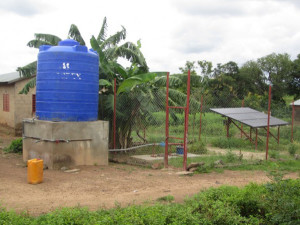Source: nationalgeographic.com
Published: March 21, 2013

Solar panels also power the water pump to supply water for domestic use. This reservoir is connected to six water taps. (image via Chad Lipton/National Geographic Society)
Less than 25 percent of the population has access to electricity in the small West African country of Benin (map). In rural areas, the rate is even lower. Without an alternative, locals use kerosene for lighting needs, which contributes to health problems and is very costly.
Climate conditions create challenges for Benin as well. In the northern part of country, there is only one rainy season compared to two rainy seasons in the south. One rainy season means that farmers have fewer options to grow crops. In the north, farmers grow corn, millet, peanuts, sorghum, soy and little else. There is not enough rainfall for farmers to water their subsistence crops and to also have enough water for fruits or vegetables.
These circumstances make it a struggle for people in Benin to lead productive lives. But it was a good opportunity for the Solar Electric Light Fund (SELF) to test an innovative solution: its Solar Market Garden technology. The Solar Market Garden aims to provide reliable water for irrigation while also providing electricity. To implement the project, SELF teamed up with ADESCA, a local NGO working for economic, social and cultural development in the northern district of Kalale. (See related story: “Solar Energy Brings Food, Water and Light to West Africa“)
In the Kalale district, SELF and ADESCA installed solar panels to power the Solar Market Garden in two villages, and construction is under way in eight more villages. Solar panels provide electricity for a pump attached to a deep-water borehole that sends water to a reservoir. The reservoir is located at the top of the garden, which is as large as a football field, and feeds up to 21 cubic meters (5,547 gallons) of water to the garden via drip irrigation.
As sites for the technology, SELF and ADESCA identified local women’s groups that already run farm cooperatives. With a reliable source of irrigation, they can now grow diverse vegetables, such as cabbage, carrots, eggplant, green beans, lettuce, onion, spinach and tomato. During the rainy season, women tend to their individual farms for subsistence crops and rely on their original farming practices, while also benefiting from the harvest of newly available vegetables.
ADESCA solar technician Zacharie Sero Tamou explained, “During the dry season, families suffer nutritional deficiencies, which have a negative impact on child and adult health. The Solar Market Garden allows families to have fresh vegetables year round and improves the health of the children. Women can sell vegetables on the market and everyone is happy with this service.”
The Solar Market Garden has promising implications, and people are taking notice. SELF has received requests to duplicate these efforts and has already installed a solar market garden in Corporant, Haiti. More requests are likely to follow.
Solar panels near the garden also provide power to fill a separate reservoir that delivers water for household consumption. A local group collects money from customers and sets it aside for future repairs.
In addition to addressing food and water needs, SELF and ADESCA are currently installing supplementary solar panels to power a health clinic, Internet center, market and school. These developments have the power not just to improve lives, but to save lives, particularly in the case of the health clinic.
The health clinic’s director said, “There will be light for women who give birth at night…and we will have a proper fridge for vaccines.” Local health clinics have minimal tools to address complications during childbirth. Without light at night, challenges are much greater. For vaccines, he relies on a gasoline-powered fridge. When gasoline is not available, vaccines expire more quickly.
